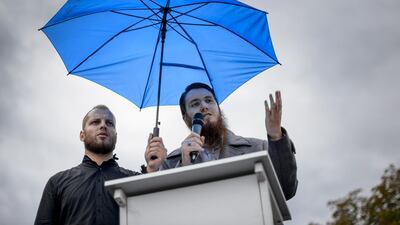Swiss security services have warned a terrorist attack by ISIS in Europe is “likely”, in their annual intelligence report.
The report said the terrorist group remains a “dominant force”, but also warned of the new threat posed by left-wing extremists, over concerns they are trying to take control of the Black Lives Matter movement.
The Federal Intelligence Service (FIS) released its annual security report this week, raising concerns about Islamist terror groups in the country and the threat of returning fighters.
In September, Switzerland suffered its first extremist attack on home soil since 2011 when a Portuguese man was murdered outside a kebab shop.
The suspect had just been released from prison and was known to the FIS for at least three years.
"The first half of 2020 has already seen more acts of [extremist] violence than the previous year, with the majority of them being attacks carried out by lone perpetrators with knives," it said.
"The recent homicide in Morges, in September, fits this pattern. It was the first terrorist attack in Switzerland since 2011 and the first terrorist attack on Swiss soil.
“In the context of jihadi terrorism, ISIS continues to be the dominant force. Further attacks in Europe are likely – inspired first and foremost by this terrorist group.
"In Switzerland, the terrorist threat is heightened, but while it is among the countries viewed as legitimate targets by the [extremists], it is not top of their list."
The FIS warned that the threat posed by returning foreign ISIS fighters cannot be ignored.
“Deradicalisation and reintegration into Swiss society could be a lengthy process and may, in some cases, even be futile,” it said.
"Returnees might remain faithful to their [extremist] ideology, radicalise their environment and plan, organise or carry out terrorist attacks. In addition, some may have gained combat experience and specific skills they could use to carry out terrorist activities.
"The long-term risk of individuals who have returned crossing state borders and networking with others is not to be ignored. Switzerland's security interests might consequently also be affected by returning [extremists] travelling from other European states."
The terrorist threat in Switzerland has been at a heightened level since November 2015 and although ISIS is the predominant threat, the risk posed by Al Qaeda still “persists”, it said.
On Tuesday, Nicolas Blancho, president of the Islamic Central Council of Switzerland, and its spokesman Abdel Azziz Qaasim Illi, were handed suspended sentences for spreading propaganda supporting the former leader of Al Qaeda's Syrian branch, Jabhat Al Nusra.
"The threat to Switzerland remains elevated. Attacks are to be expected," it said.
"There is a diverse range of possible scenarios as the terrorist threat is becoming increasingly diffuse.
"In Switzerland, attacks on soft targets, such as transport facilities or gatherings of people, involving little organisational or logistical outlay, remain the most likely threat. Such attacks are most likely to be carried out by lone perpetrators or small groups.”
The report also warned of the growing threat of left-wing extremists and said they caused “extreme violence” during two Black Lives Matter protests in Zurich.


